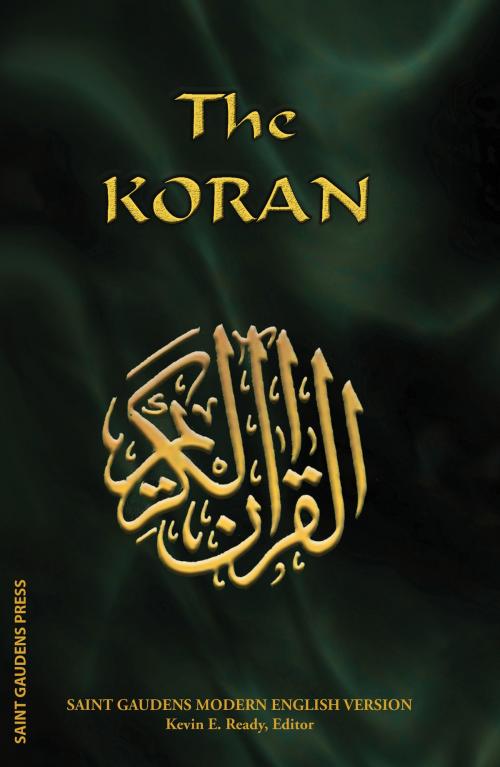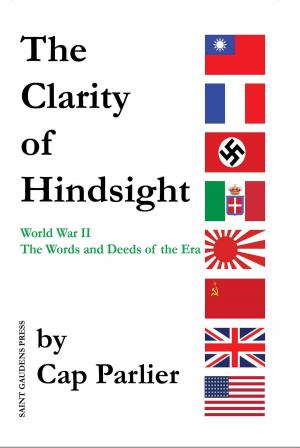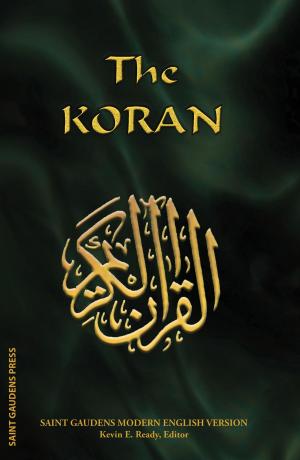Holy Koran: Saint Gaudens Modern Standard Version
Nonfiction, Religion & Spirituality, Middle East Religions, Islam| Author: | Kevin E. Ready | ISBN: | 9780943039084 |
| Publisher: | Saint Gaudens Press Inc | Publication: | April 27, 2013 |
| Imprint: | Smashwords Edition | Language: | English |
| Author: | Kevin E. Ready |
| ISBN: | 9780943039084 |
| Publisher: | Saint Gaudens Press Inc |
| Publication: | April 27, 2013 |
| Imprint: | Smashwords Edition |
| Language: | English |
Updated modern English version of the Holy Koran. Totally re-edited and translated to allow English speaking readers to understand the classical Koranic verse.
Top quality eBook version with properly formatted verse and chapters.
Avoids the stilted antiquated language of other English translations.
The purpose of this work is to provide the English speaking reader with an easily readable version of the Koran. I have always found it curious that most previous English translations of the Koran adopt a linguistic affectation of the King James Version of the Christian Bible in an attempt to give their edition an affectation of religious or biblical flavor. The archaic sixteenth-century English of King James does a disservice to the Classical Arabic original Koran when read by a modern reader. Other available versions of the Koran in English carry a stilted, imprecise English more appropriate for a Bollywood movie. The words of the Prophet Mohammed and his God should not be in the stilted voice of a Shakespearean era Anglican cleric or a inarticulate English voice. The unnecessarily confusing language of most Koranic translations leads to misunderstanding of basic concepts and difficulty in study by modern English readers. Just as modern, revised versions of the Christian Bible have become a standard for Bible study, it was felt that a more modern version of the Koran would serve Western readers. One thing we have kept from the archaic biblical English format is the capitalization of pronouns referring to God. It seems to give clarity to many massages when the deity is speaking of himself, especially in the Arabic translation, where pronouns are highly repetitive. We also use the first person plural “We” when the deity speaks of himself, since the original Arabic clearly has God speaking of himself in the plural pronoun and verb form. While it remains a tenet of the Muslim faith that study of the Koran should be in the classic Arabic, the reality is that many would-be readers of the Koran have no knowledge of Arabic and little grasp of King James’ vernacular and, thus, the need for this work.
Irrespective of our intent to give a modern English voice to the Koran, it must be recognized that Classical Arabic is a lyrical, structured language, quite different from English. And, there are parts of the Koran that are best described as free-form poetry and the form, function and meaning of those passages would be lost if simply translated to prose English. In such sections of the Koran, both the short, lyrical verse and in the lengthy supplications and prayers, we have kept the structure of the original Arabic and translated the words so as to best evoke the original meaning. In other sections, such as stories, instructions, laws and histories, we have adopted a modern, prose paragraph format. We have kept the verse numbering of the original, made the numbering of verses less intrusive on the reading and less conspicuous. We have also followed the predominant method of not numbering the opening supplication in each chapter as a verse. The Surahs have been renamed as Chapters and their title is given in both Arabic and English.
Updated modern English version of the Holy Koran. Totally re-edited and translated to allow English speaking readers to understand the classical Koranic verse.
Top quality eBook version with properly formatted verse and chapters.
Avoids the stilted antiquated language of other English translations.
The purpose of this work is to provide the English speaking reader with an easily readable version of the Koran. I have always found it curious that most previous English translations of the Koran adopt a linguistic affectation of the King James Version of the Christian Bible in an attempt to give their edition an affectation of religious or biblical flavor. The archaic sixteenth-century English of King James does a disservice to the Classical Arabic original Koran when read by a modern reader. Other available versions of the Koran in English carry a stilted, imprecise English more appropriate for a Bollywood movie. The words of the Prophet Mohammed and his God should not be in the stilted voice of a Shakespearean era Anglican cleric or a inarticulate English voice. The unnecessarily confusing language of most Koranic translations leads to misunderstanding of basic concepts and difficulty in study by modern English readers. Just as modern, revised versions of the Christian Bible have become a standard for Bible study, it was felt that a more modern version of the Koran would serve Western readers. One thing we have kept from the archaic biblical English format is the capitalization of pronouns referring to God. It seems to give clarity to many massages when the deity is speaking of himself, especially in the Arabic translation, where pronouns are highly repetitive. We also use the first person plural “We” when the deity speaks of himself, since the original Arabic clearly has God speaking of himself in the plural pronoun and verb form. While it remains a tenet of the Muslim faith that study of the Koran should be in the classic Arabic, the reality is that many would-be readers of the Koran have no knowledge of Arabic and little grasp of King James’ vernacular and, thus, the need for this work.
Irrespective of our intent to give a modern English voice to the Koran, it must be recognized that Classical Arabic is a lyrical, structured language, quite different from English. And, there are parts of the Koran that are best described as free-form poetry and the form, function and meaning of those passages would be lost if simply translated to prose English. In such sections of the Koran, both the short, lyrical verse and in the lengthy supplications and prayers, we have kept the structure of the original Arabic and translated the words so as to best evoke the original meaning. In other sections, such as stories, instructions, laws and histories, we have adopted a modern, prose paragraph format. We have kept the verse numbering of the original, made the numbering of verses less intrusive on the reading and less conspicuous. We have also followed the predominant method of not numbering the opening supplication in each chapter as a verse. The Surahs have been renamed as Chapters and their title is given in both Arabic and English.















